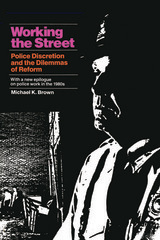2 books about Police professionalization

Policing Women
The Sexual Politics of Law Enforcement and the LAPD
Janis Appier
Temple University Press, 1998
Many of us take the presence of policewomen on patrol and in investigative roles for granted. Realistic dramas and comedies in the movies and on television show women officers performing the same duties as men on the force. This visibility tells us nothing about the hostility and controversy that have beset policewomen since they were first hired by police departments in the 1910s. Author Janis Appier traces the origins of women in police work, explaining how pioneer policewomen's struggles to gain secure footholds in big city police departments ironically helped to make modern policework one of the most male dominated occupations in the United State.
With a new vision of non-coercive police work and crime prevention, Progressive reformers exerted political and social pressure to create positions for female officers dedicated to guiding and protecting juveniles and women. Women reformers pointed to changing sexual mores among working-class female youth to emphasize the need for a new approach to policing.
The policewomen who undertook the work of counseling sexually active teenage girls and their families saw themselves as helping young people achieve moral equilibrium during a period in which standards of context were in flux. In the Los Angeles Police Department, the first to hire women, this social work was primarily the responsibility of the City Mother's Bureau; in other major cities, policewomen's roles were similarly constructed as maternalistic. Scrutinizing case records, public statements, and departmental policies governing policewomen, Appier shows how female officers handled the complex gender politics of their work with the public and within their departments.
Appier reveals that many of these pioneering policewomen succeeded in expanding the scope of policework and carving out a rewarding professional niche, despite continued attempts to oust them or limit their sphere of action. But this advancement was short-lived; within a generation a masculinized model of crime fighting took hold, and policewomen's authority eroded.
With a new vision of non-coercive police work and crime prevention, Progressive reformers exerted political and social pressure to create positions for female officers dedicated to guiding and protecting juveniles and women. Women reformers pointed to changing sexual mores among working-class female youth to emphasize the need for a new approach to policing.
The policewomen who undertook the work of counseling sexually active teenage girls and their families saw themselves as helping young people achieve moral equilibrium during a period in which standards of context were in flux. In the Los Angeles Police Department, the first to hire women, this social work was primarily the responsibility of the City Mother's Bureau; in other major cities, policewomen's roles were similarly constructed as maternalistic. Scrutinizing case records, public statements, and departmental policies governing policewomen, Appier shows how female officers handled the complex gender politics of their work with the public and within their departments.
Appier reveals that many of these pioneering policewomen succeeded in expanding the scope of policework and carving out a rewarding professional niche, despite continued attempts to oust them or limit their sphere of action. But this advancement was short-lived; within a generation a masculinized model of crime fighting took hold, and policewomen's authority eroded.
[more]

Working the Street
Police Discretion and the Dilemmas of Reform
Michael K. Brown
Russell Sage Foundation, 1981
Now available in paperback, this provocative study examines the street-level decisions made by police, caught between a sometimes hostile community and a maze of departmental regulations. Probing the dynamics of three sample police departments, Brown reveals the factors that shape how officers wield their powers of discretion. Chief among these factors, he contends, is the highly bureaucratic organization of the modern police department. A new epilogue, prepared for this edition, focuses on the structure and operation of urban police forces in the 1980s. "Add this book to the short list of important analyses of the police at work....Places the difficult job of policing firmly within its political, organizational, and professional constraints...Worth reading and thinking about." —Crime & Delinquency "An excellent contribution...Adds significantly to our understanding of contemporary police." —Sociology "A critical analysis of policing as a social and political phenomenon....A major contribution." —Choice
[more]
READERS
Browse our collection.
PUBLISHERS
See BiblioVault's publisher services.
STUDENT SERVICES
Files for college accessibility offices.
UChicago Accessibility Resources
home | accessibility | search | about | contact us
BiblioVault ® 2001 - 2024
The University of Chicago Press









